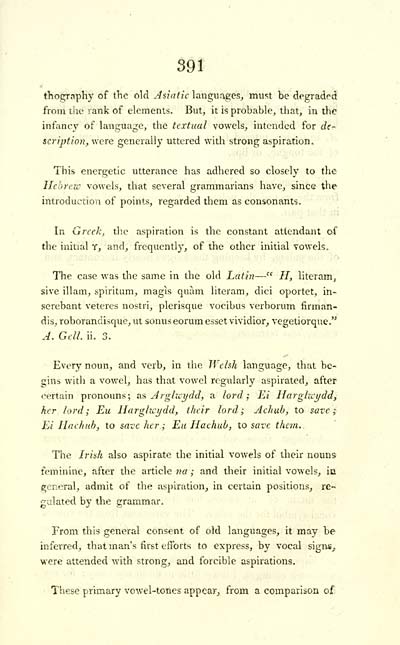Blair Collection > Celtic researches, on the origin, traditions & language, of the ancient Britons
(485)
Download files
Complete book:
Individual page:
Thumbnail gallery: Grid view | List view

391
thogrnphy of the old Asiatic languages, must be degradrd
from the rank of elements. But, it is probable, that, in the
infancy of language, the textual vowels, intended for de-
scription, were generally uttered with strong aspiration.
This energetic utterance has adhered so closely to the
Hebrew vowels, that several grammarians have, since the
introduction of points, regarded them as consonants.
In Greek, the aspiration is the constant attendant of
the initial τ, and, frequently, of the other initial vowels.
The case was the same in the old Latin — " H, literam,
sive illam, spiritum, magis quam literam, dici oportet, in-
serebant veteres nostri, plerisque vocibus verborum firman-
dis, roborandisque, ut sonus eorum esset vividior, vegetiorque."
A. Cell. ii. 3.
Every noun, and verb, in the JVelsh language, that be-
gins with a vowel, has that vowel regularly aspirated, after
certain pronouns; ns Arglzci/dd, a lord; Ei Haiglzcydd,
her lord; Eu Harghci/dd, their lord; Achub, to save;
Ei Hachub, to save her ; Eu Hachub, to save them..
The Irish also aspirate the initial vowels of their nouns
feminine, after the article ììu ; and their initial vowels, iu
general, admit of the aspiration, in certain positions, re-
gulated by the grammar.
From this general consent of old languages, it may be
inferred, that man's first efforts to express, by vocal signS;,
were attended with strong, and forcible aspirations.
These primary vowel-tones appear, from a comparison of
thogrnphy of the old Asiatic languages, must be degradrd
from the rank of elements. But, it is probable, that, in the
infancy of language, the textual vowels, intended for de-
scription, were generally uttered with strong aspiration.
This energetic utterance has adhered so closely to the
Hebrew vowels, that several grammarians have, since the
introduction of points, regarded them as consonants.
In Greek, the aspiration is the constant attendant of
the initial τ, and, frequently, of the other initial vowels.
The case was the same in the old Latin — " H, literam,
sive illam, spiritum, magis quam literam, dici oportet, in-
serebant veteres nostri, plerisque vocibus verborum firman-
dis, roborandisque, ut sonus eorum esset vividior, vegetiorque."
A. Cell. ii. 3.
Every noun, and verb, in the JVelsh language, that be-
gins with a vowel, has that vowel regularly aspirated, after
certain pronouns; ns Arglzci/dd, a lord; Ei Haiglzcydd,
her lord; Eu Harghci/dd, their lord; Achub, to save;
Ei Hachub, to save her ; Eu Hachub, to save them..
The Irish also aspirate the initial vowels of their nouns
feminine, after the article ììu ; and their initial vowels, iu
general, admit of the aspiration, in certain positions, re-
gulated by the grammar.
From this general consent of old languages, it may be
inferred, that man's first efforts to express, by vocal signS;,
were attended with strong, and forcible aspirations.
These primary vowel-tones appear, from a comparison of
Set display mode to: Large image | Transcription
Images and transcriptions on this page, including medium image downloads, may be used under the Creative Commons Attribution 4.0 International Licence unless otherwise stated. ![]()
| Early Gaelic Book Collections > Blair Collection > Celtic researches, on the origin, traditions & language, of the ancient Britons > (485) |
|---|
| Permanent URL | https://digital.nls.uk/75769230 |
|---|
| Description | A selection of books from a collection of more than 500 titles, mostly on religious and literary topics. Also includes some material dealing with other Celtic languages and societies. Collection created towards the end of the 19th century by Lady Evelyn Stewart Murray. |
|---|
| Description | Selected items from five 'Special and Named Printed Collections'. Includes books in Gaelic and other Celtic languages, works about the Gaels, their languages, literature, culture and history. |
|---|

